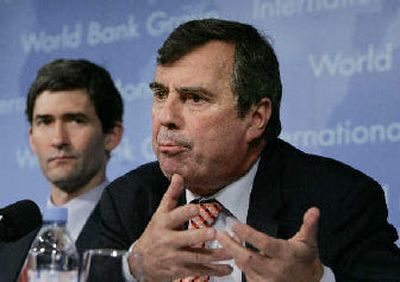High energy costs are here to stay, IMF chief warns

WASHINGTON — Higher energy prices probably will be around awhile, the head of the International Monetary Fund says.
Thus far, the world economy has coped well with the rising cost of energy, but surging prices do pose a serious risk down the road, Rodrigo Rato suggested Thursday.
“It is likely that higher prices are going to last, and we are all going to have to adjust to that,” he said.
In the United States, oil prices closed at a record high of $72.17 a barrel on Wednesday and slipped to $71.95 on Thursday.
Skyrocketing energy prices will figure prominently on the agenda of the world’s seven largest economic powers when they gather on Friday. Discussions on worldwide economic matters will carry over into the weekend meetings of the IMF and the World Bank.
The United States, Japan, Germany, France, Britain, Italy and Canada make up the Group of Seven most industrialized countries in the world.
Rato said reducing obstacles to investment to boost energy supplies, reinvigorating conservation programs and improving oil market statistics are a few things that could be done to help improve the situation.
“These measures would take some time to have their full effect, but taking them would help calm the oil market,” Rato said.
World Bank president Paul Wolfowitz on Thursday stressed the importance of efforts to thwart corruption, which can be an obstacle to effective development. “There is a lot the international community can do,” he said.
He was briefly interrupted by hecklers who chanted “corporate corruption who can we thank? The IMF and the World Bank.”
Rato, in a speech to the Institute for International Economics, talked about the need for increases in the voting power for some countries at the fund and the search for ways to broaden its sources of income. With the global economy thriving, the fund’s revenue from lending has lessened.
“There are some things we can do, including restraint in our operational budget and setting user fees for some of our technical assistance,” Rato said. “But if members want the fund to continue the work that we have been doing in many areas — and they tell me repeatedly that they do — we will need to broaden the fund’s income base,” he said.
Separately, efforts to trim the U.S. budget deficit would have only a limited role in helping the U.S. shrink its massive current account deficit, according to a paper released by the Treasury Department.
The current account deficit swelled to a record $804.9 billion last year.
The current account is considered the best measure of a country’s international economic standing because it tracks not only goods and services but also investment flows between countries.